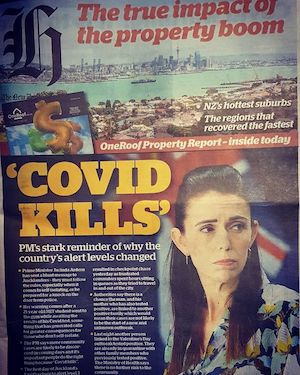By RNZ News
Prime Minister Jacinda Ardern says she gets that everyone is angry over the latest New Zealand community covid-19 cases after it emerged there was contact between two families, but the important thing is to fix the situation.
Contact between the families was not disclosed to contact tracers prior to the earlier family going into quarantine, Ardern said.
She could not say why that was not disclosed, but it now explains how the infection came about.
“We have now confirmed how our latest case M and N came to be infected with covid-19. That is because they had contact with another family that we had identified as part of the Papatoetoe cluster during level 3. Unfortunately this contact was not disclosed to our contact tracers prior to the individuals going into quarantine,” she said.
Auckland is in a seven-day level 3 lockdown and the rest of New Zealand is at level 2.
The case reported last evening is the fifth member of a six-person household to test positive. The first – a student at Papatoetoe High School – tested positive early on February 23, followed by two siblings later in the day.
The family was moved to quarantine the same day, with another member testing positive on 26 February.
One of the new community cases announced on Saturday is the 21-year-old sibling of a another student from Papatoetoe High School. The student had showed no symptoms and tested negative three times.
The siblings’ mother has also tested positive.
Family members isolating
The 21-year-old is a student at Manukau Institute of Technology, and works part-time for Kerry Logistics (Oceania) Limited at Auckland Airport. This person was potentially infectious before testing positive and had not been self-isolating.
All members of the household of five are now isolating.
Ardern told RNZ Morning Report today about the contact disclosure between the families during lockdown: “Obviously very frustrating information … because this happened in a level 3 environment.
“I cannot tell you what the cause of that was from those that wer

e originally interviewed because of course those interviews would have taken place before this family went into quarantine over a week ago.
“We came to discover this information through the latest case, so the latest family told us about the contact that was had. We will go back and re-interview that family to see if there is any other information that was not shared with us.
“I cannot tell you whether it was for fear that it occurred during level 3 or lack of memory, I cannot tell you that.”
Fines already available
Ardern said she did not believe there was any wilful decision to ignore advice.
There were two family members in the latest cases, and the contact was not the 21-year-old but the other case, Ardern said.
Ardern said there were already fines and the ability to take enforcement action.
“Those decisions are made by police.”
She said the most important consideration was getting the truth quickly.
“Everyone is angry. I absolutely accept that people want to see repercussions. At the same time, how do we make sure people tell us the truth, because there is nothing more valuable to us that knowing in these scenarios where contact has occurred.”
Multiple people in the February cluster have flouted the self-isolation directives, including the 21-year-old in the latest cases who visited several numerous locations while potentially infectious.
‘Judgement for police”
“This won’t be a judgement for me, this will be a judgement for police.”
Some are now suggesting electronic monitoring, police or military checks, and fines to crack down on these cases, but Jacinda Ardern isn’t convinced.
Ardern said electronic monitoring, for example, would not have made a difference in this case given the first family was already identified, tested and in quarantine.
“Someone said to me ‘I’m in the seven stages of grief and I’m lingering on anger’. I totally get that. But it won’t change where we are, we have to fix the situation, right it, and get these restrictions lifted again.”
Ardern said it was not the wrong decision to lift the first February lockdown because contact had occurred in level 3.
“We were at the right level at the right time, we just needed people to follow the rules.”
No one would have accepted a continual Auckland lockdown for 21 days, she said.
Infectious exposure
On whether Auckland’s level 3 will have to go beyond a week, Ardern said one of the concerns was the amount of exposure the 21-year-old had while potentially infectious.
“We make sure we leave five days because you don’t generally get positives if you test too early.
“Once we start getting results first from some of those close contacts we’ll get a bit of a sense of how this outbreak is behaving.”
She anticipates level 3 will run for the full seven days and decisions on changing alert levels will be made as evidence comes in.
This article is republished under a community partnership agreement with RNZ.
Article by AsiaPacificReport.nz





